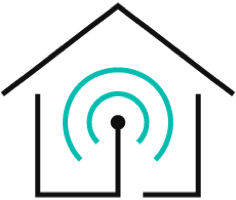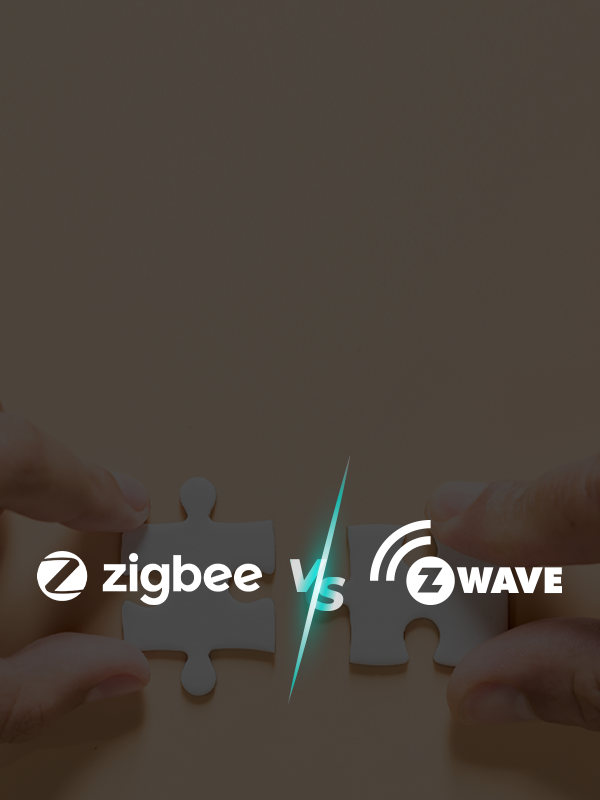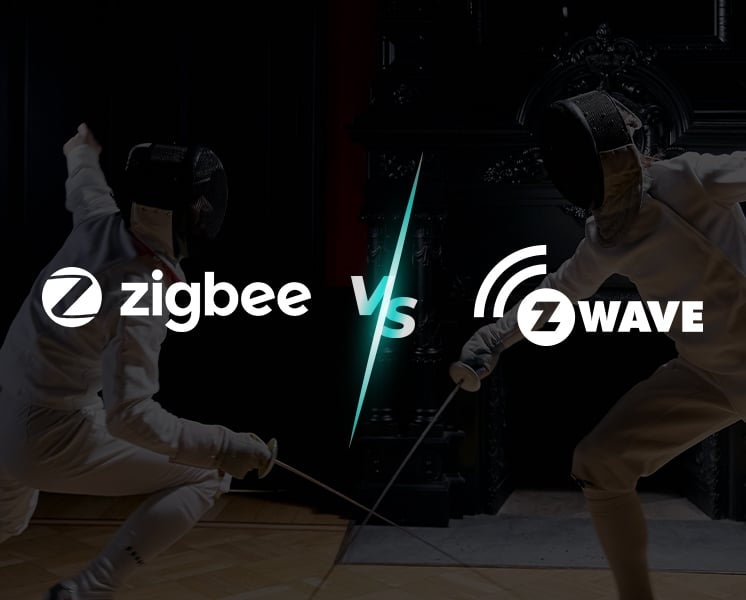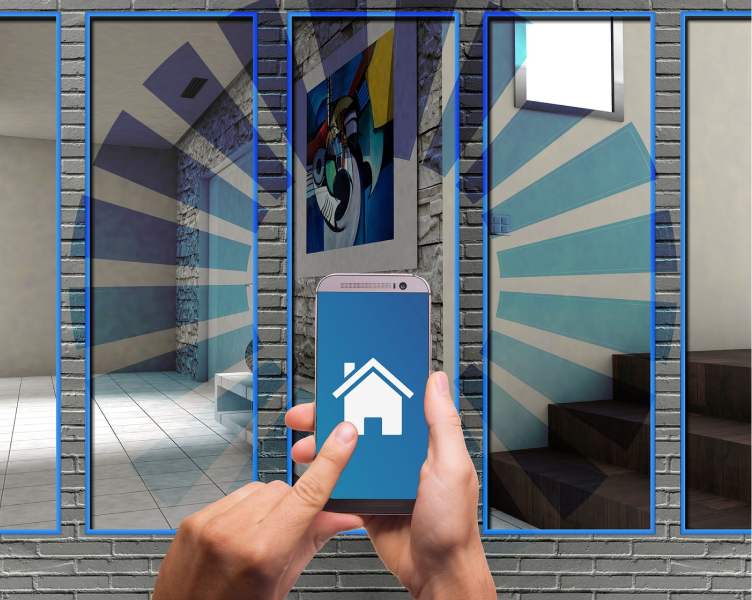When it comes to building a fully connected smart home system, Zigbee and Z-Wave are the two most popular wireless protocols. Compare to smart Wi-Fi devices, Zigbee and Z-wave devices offers mesh networking and only use a fraction of the power.
If you are only interested in controlling a few devices, stick with Wi-Fi devices. But if you want to set advanced smart home automation, such as automatically turning on the lights when you come home or locking the door when no one is home, you can only do it with Zigbee and Z-Wave devices.
Both are great protocols for smart home automation. Based on your situation you may need Zigbee devices or Z-Wave devices or both.Let's see the difference Zigbee vs Z-Wave now.
Zigbee vs Z-Wave
| Zigbee | Z-Wave | |
| Network Config. | Mesh network | Mesh network |
| Frequency | 2.4 GHz | 800-900 MHz |
| Speed | 40-250 kbps | 9.6-100 kbps |
| Range (indoor) | 10-20m | 100m |
| # Connected Devices | 65000+ | 232 |
| # Compatible Devices | ~2500 | ~2400 |
| Power Consumption | Very Low | Very Low |
| Protocol Standard | Open | Closed |
| Hops | Unlimited | 4 |
| Encryption | AES-128 | AES-128 |
Mesh Network
Both Zigbee and Z-Wave supports mesh networking. In Laymen’s term, mesh networking allows data to hob from 1 device to another, thus creating longer distances. With Wi-Fi network, all the devices communicate directly with the hub. If they are out of the range of the hub, they will not work.
Reliability
Zigbee and Wi-Fi operate on the same 2.4 GHz frequency which may cause interference issues. Z-Wave, on the other hand, operates on a frequency between 800-900s MHz. It won’t have interferences issues with Wi-Fi, but the frequencies differ based on where you live. If you bought a Z-Wave device in the US, it won’t work on the hub you got Europe. Zigbee devices are universal, they will work the same anywhere in the world.
Zigbee has a faster data transmission rate at 250 kbps compare to Z-Wave at 100 kbps. Z-Wave, however, has a longer range at 100m compared to Zigbee’s at 20m.
Power Usage
Both protocols use only a fraction of the power of Wi-Fi devices. Many Zigbee and Z-Wave devices can run on a coin cell battery for a couple of years, whereas Wi-Fi devices would be dead within a few days. Zigbee devices use slightly less than Z-Wave.
Protocol Standard
Zigbee is an open standard maintained by the Zigbee Alliance. That means manufacturers can have their hardware Zigbee certified but change the software to make their products only compatible with their own hub. To meet different applications needs, Zigbee Alliance also released different Zigbee standards: Zigbee Home Automation, Zigbee Light Link, etc.
Z-Wave is closed standard maintained by the Z-Wave Alliance. All Z-Wave devices must adhere to a rigid set of standards to be certified. That means that all Z-Wave certified devices should work with all Z-Wave certified hub.
Price
Generally, Zigbee devices are cheaper than Z-Wave devices. If you search on Amazon US store, you can find a Zigbee motion sensor for $10-20, but Z-Wave motion sensor would go for $30-$60. ‘Amazon’s prime’ color light bulbs are $11 and $30 for Zigbee and Z-Wave respectively. There are other devices where Z-wave devices are the same price as Zigbee devices such as Yale Assure Lock (Zigbee and Z-Wave version).
Brands
Brands that use Zigbee protocol: Philips Hue, Amazon Echo Plus, Ikea Tradfri, Yale Smart Locks, Sengled Lights, GE, LG, Xiaomi, Bosch
Brands that use Z-Wave protocol: Honeywell thermostat, August Locks, Yale Smart Locks, Aeotec, GE, First Alert, Fibaro
- If you’re in a closed space with dozens of Wi-Fi networks and hundreds of devices, get Z-Wave devices.
- If you plan to move to a different country, get Zigbee devices (Z-wave uses different radio frequency depending on the country. Although countries of EU use the same Z-wave frequency)
- If you are only planning to get half a dozen devices and they are far apart, get Z-Wave devices. (Z-wave has longer range)
- If you want to buy devices that will most likely work with your hub, get Z-Wave devices.
- If you’re on a tight budget, get Zigbee devices.
- If you don’t care about smart automation and only wants to control a few devices, get Wi-Fi devices.
General Advice
General advice when getting Zigbee devices
- Make sure they are Zigbee certified
- Check your hub’s compatibility list (Make sure the model is the same, some products have the same design but different generation)
- If it’s not listed, check if your hub supports that type of device (e.g. if your hub doesn’t support smart window blinds, then the devices won’t work)
- If the type is supported, check to see if the Zigbee devices use proprietary software (e.g. they can only be connected to their manufacture’s hubs).
- Philips Hue is proprietary, but some hubs can control Philips Hue devices through the Philips Hue Bridge. (For e.g. Mixtile Hub, SmartThings Hub)
- If the manufactures don’t make their own hubs, the devices will most likely be able to connect your hub)
General advice when getting Z-Wave devices
- Make sure they are Z-Wave certified
- Check if your hub uses the same frequency as the device (E.g. if you bought your hub in the US, devices from E.U. will not work properly)
- Check your hub’s compatibility list (Make sure the model is the same, some products have the same design but different generation)
- If it’s not listed, check if your hub supports that type of device (e.g. if your hub doesn’t support smart window blinds, then the devices won’t work)
If you are looking for a Zigbee smart light switch for your home, welcome to learn more Evvr In-Wall Relay Switch, a Zigbee 3.0 no-neutral wire smart switch product.
And you are welcome to learn more about the differences between Zigbee vs Z-Wave on our new blog article: Zigbee vs Z-Wave: What's the difference ?
Matter compatible devices and differences between protocols















